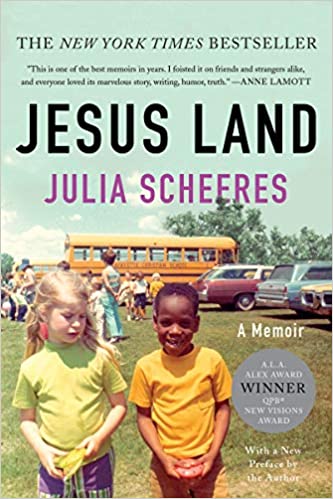Jesus Land (Review)
by Julia Scheeres

This isn’t for everyone…

This book is a memoir published by Counterpoint and is the author’s first book. It made the NYT bestseller list. Her second book, A Thousand Lives: The Untold Story of Hope, Deception, and Survival at Jonestown was published in 2011.
Verdict: Maybe the toughest book for me to review so far. This will appeal to a certain progressive audience while it is NOT a book for many conservatives, especially if you are deeply religious or come from a traditional midwestern upbringing (or both). While the book was well-written and moves along at a great pace, it was hard for me to believe it was not filled with embellishment or outright fiction–OR maybe this is genuinely what the author saw through her own eyes. Maybe that’s the point – what happened to her IS unbelievable. The viewpoint is so dark (coming mostly from a child and teenager), you wonder what the “terrible people” in this book would say about her view of the story. It’s also not a PG-13 book; it deals with some tough subjects.
What’s it about? The two most clear-cut themes are abuse and racism in middle America in the 1980s.
It’s a memoir about the author’s childhood and teenage years in rural Indiana. She has an adopted brother, David, who is black (and another adopted brother, Jerome, who plays a lesser part). Her parents are fundamentalist Christians-her mother seems to want to be rid of her children, is mentally abusive, and unloving to say the least. The father’s main role is to pop-up and physically abuse his adopted black children; he’s not a beer-bellied drinker but a middle-class successful surgeon. (You have to wonder why these people adopted two black children and then abused them.)
A good part of the first half of the book takes place near Lafayette, Indiana, mostly at their home and school. These parents are clearly painted as the worst parents on earth. But again, you have to wonder, with the antics of Julia (a loner, sleeping with a boy who climbs in through the window, trouble at school, gets drunk up in her room, etc.), what the parent’s story would be. Maybe from their viewpoint, they were at their wit’s end and were desperate in dealing with her.
Anyway, about midway through the book, after chapters of abuse, racism, anti-religiosity, sadness, and almost complete negativism, the kids are sent (David first) to a religious institution in the Dominican Republic for wayward kids. The adults at this institution have no redeeming value to the author nor does the institution. It is seen in her eyes as incarceration – a prison she cannot escape where the adults are crazy religious nuts who try to brainwash or browbeat the kids into accepting Jesus. (Note: There was a film made in 2014 called Kidnapped for Christ about the school. Can’t comment on it, but plan to watch it some day.)
The Story (plot and character): The entire story is from Julia’s POV…it’s a memoir.
It’s starts a bit slow opening with a gang of racist white boys after David and Julia on their bikes. Sets the stage for what’s to come. Once you get into a few chapters, it moves along nicely, yet, it is raw, crude, and emotionally unsettling. The first part of the book is made up of varied (mostly bad) memories of Julia struggling with her parents, her friends (or lack of), school, boys, her other siblings, alcohol, etc.
The second part of the book takes place at a religious reform school in the Dominican Republic called Escuela Caribe. At first, Julia’s brother David is sent away to the school by her parents. Then Julia. She is excited to be reunited with David but quickly finds the school so suffocating, abusive, and prison-like that she rarely has a chance to truly interact with her brother.
To speak of plot in a memoir is a bit unfair given true life rarely works in the way a novel does. That said, many will find themselves wanting Julia to escape from her parents and small-town Indiana, wanting Julia (and David) to escape from the reform school, and wanting both to find their peace in their youthful dream of escaping to Florida together. As for characters, the personalities in this book are anything but flat. The bad people are clearly bad, the racism real, and the suffering genuine.
What’s good about the book? The writing is good, and though I wouldn’t consider it a page-turner, it kept me engaged from start to finish. Character development is excellent. Depending on your viewpoint, you’ll come to really hate the mother and father and especially the folks who run the reform school in the Dominican Republic. Julia comes off as a troubled pre-teen and teen that some readers may identify with. Again, you’ll either feel strongly for her or shake your head in disbelief. And finally, for those who can identify with the author in some way, the story should be incredibly cathartic. Raw, crude, and joyless, but cathartic.
What was not so good? As long as you buy-in to the story, you’ll find very little not to “like” about the book. If not, you may find yourself upset with the entire story. Either way, it should hit some emotional triggers in the reader that are cause for genuine discomfort.
Bottom line: Sorry to harp, but if you buy-in to the story and identify with it, you’ll rate this as a 5-star memoir. If you are deeply religious, you may hate this book and rate it as a 1- or 2-star effort. If you are in the middle, who knows. My rating is somewhere in the middle. I know there are two sides to every story; the author’s is well-told and emotionally jarring. But then again…